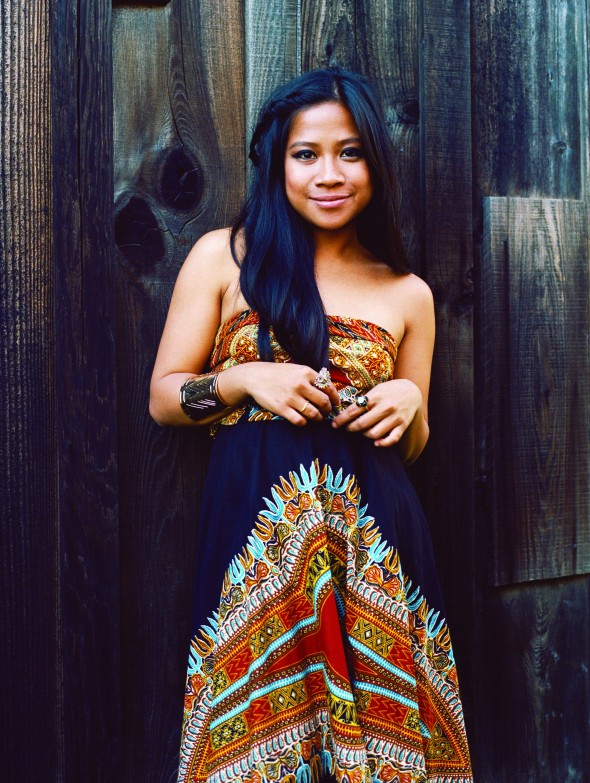
Photography by Brittany Pearce
Tiny Dynamo from Borneo
A few years ago, singer/songwriter Zee Avi wasn’t sure what she was going to do with her life. “I studied law for my pre-college A Levels, then went to the American Intercontinental University in London for design,” Avi says from her current home in Brooklyn. “I dropped out of college after two years, but I graduated in life lessons, making the transition from teen to young adult. I started writing poems in London; that led me to the next step. When I got home (to Kuala Lumpur), I picked up the guitar and started putting the poems to music. I’d played guitar before; I was even in a cover band for a while when I was younger, but this time I got addicted to practicing. Songs just erupted out of me. I was a 21-year-old, trying to find myself, and writing got me to stop thinking about my own situation for a while, which was nice.”
Then the impossible happened. “A friend of mine wanted to hear my songs and couldn’t make it to my shows, so I put up a few things on YouTube. Nothing fancy; I just hit record and played for the camera.” One of her songs, a melancholic holiday number called “No Christmas for Me,” generated 3,000 comments the day it went up on the site. One of the comments was an offer for a record deal from Jack Johnson’s Brushfire label. Avi hopped on a plane to LA and cut her eponymous first album.
Avi’s record was a low-key charmer marked by her warm, subtle vocals (think Peggy Lee meets Astrud Gilberto) and music that distilled the sounds of American pop styles from the early blues and jazz of the ‘20s to the mellow singer/songwriters of the ‘70s. “My hometown on the island of Borneo has a jazz festival every year, with all the top international players,” Avi explains. “My parents loved old jazz and had a big record collection, so I was drawn to those sounds too. With the help of the Internet, I discovered Billie Holiday, Ella Fitzgerald and other people from that era. For some reason, the melancholy in the music resonates with me. I like going back to the roots to see how the old songs affect modern music.”
Avi’s timeless sound struck a chord with critics and listeners, and her career took off. Zee Avi landed on the American Pop Chart and went gold in Taiwan, Singapore and Malaysia. She moved to Brooklyn, and after a year of high profile gigs, including a SXSW showcase, she returned to the studio to make her second album, Ghostbird. “‘Ghostbird’ is a direct translation of a word from my native language, which is not widely spoken, even in Borneo. It means ‘owl,’ a bird that signifies wisdom and quiet observation. It’s also a nocturnal creature, like me.”
“We made the album at Jack Johnson’s Brushfire studios, a green, solar powered studio. The rooms have a warm vibe that translated to the music we made. Some tracks were played live with the band and me making up the arrangements as we went along, just bouncing ideas off of each other. Others were built on recordings I made with just my guitar and vocals.”
Ghostbird is even more diverse musically than Avi’s debut. “Roll Your Head In The Sun” is a delirious blend of reggae and high string country music twang; “Milestone Moon” is a subtle fusion of acoustic guitar and Latin-flavored hand percussion, while “Madness” recalls the big band swing of ‘40s vocal groups like the Andrews Sisters with its muted trumpet and trombone solos. The most atypical cut is “Concrete Wall,” a tune Avi put together in her bedroom using the GarageBand program. “It’s all vocals, except for some percussion samples that were added by (producer) Cut Chemist. I looped a rhythmic vocal of me going ‘boom sha qua qua’ and sang the melody over it. I’ve never done anything like it before.”
Several tunes on Ghostbird feature Avi’s skillful ukulele strumming, but she only picked up the instrument recently. “I’ve had a uke for maybe two years,” she says. “It’s becoming my main instrument because it’s an appropriate size. It’s a lot easier to handle than a guitar. I’m a whopping four feet 11 inches tall, so a uke looks better on stage than a guitar. It’s hard to go wrong with it. It’s a jovial instrument, too, so sometimes I feel bad because I’m writing so many sad songs on it.”
– J.Poet

